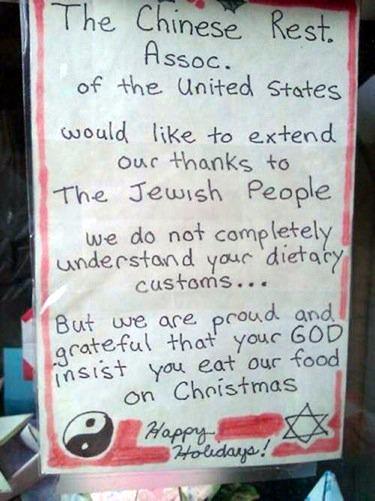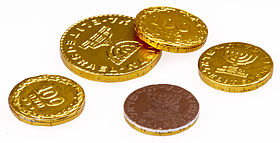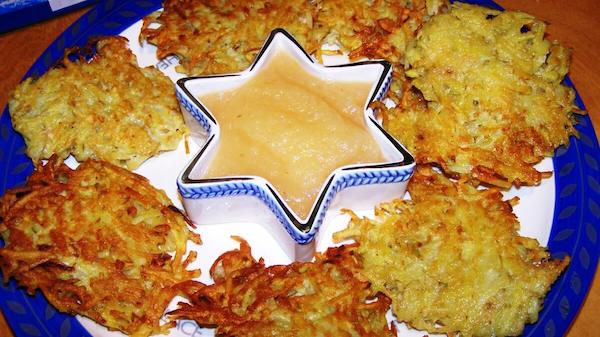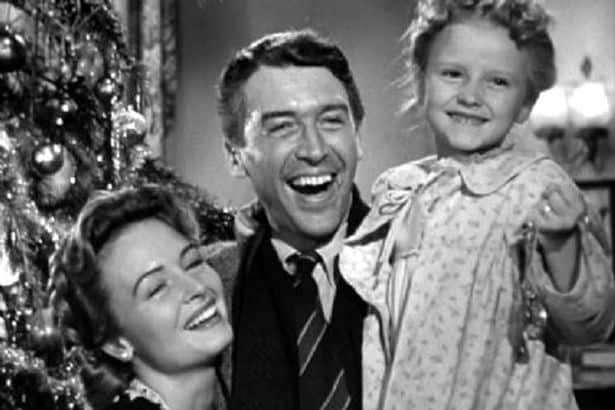{Originally posted to The Lid website}
Next Sunday night, December 22nd is the first night of the Jewish Festival of Hanukkah, and three days later is Christmas. Chanukah
‘);
_avp.push({ tagid: article_top_ad_tagid, alias: ‘/’, type: ‘banner’, zid: ThisAdID, pid: 16, onscroll: 0 });
America is supposed to be a “melting pot,” however one sad thing about the end of the year holidays is most Jews do not understand Christmas, and most Christians don’t get Hanukkah. But they should. After all, both faiths are descended from the patriarch Abraham and believe in the “golden rule.” Each of the religions believes that Jesus was a nice Jewish boy who went into his father’s business. The only difference is what they believe his father’s business was.
Since each of the holidays begins soon, it’s time for me to explain the differences between them to the people of the opposite faith. Therefore below are 18 differences between Christmas and Chanukah. Why 18? Because 18 is a significant number in Judaism. In Hebrew, the number 18 is represented by the letters that spell out Chai—life. Multiples of this number are considered good luck and are often used in gift-giving. Since this post makes fun of both holidays, I will need good luck.
1. Christmas December 25, the same day every year. It’s based on the secular solar-based calendar. Hanukkah begins on the 25th of Kislev every year. But that date is tied to the Hebrew LUNAR calendar. The Jewish calendar date of the 25th of Kislev falls on a different day of the secular calendar every year. Most Jews never know when that day falls on the secular calendar until a non-Jewish friend asks when Chanukah starts. That question forces us to consult a calendar provided free by the local Jewish Funeral Home. For the funeral home, it’s good business. That way, when someone dies in one’s family, the number to call is always handy.

BTW the Jews also celebrate December 25th. Why not? It’s a paid day off from work. So as the video below explains, we go to movies. On the 25th, there are no lines because the Gentiles are doing something else. After we leave the movie theater, we make our annual Christmas pilgrimage to get Chinese food, a traditional Jewish cuisine.

And you should believe that the Jewish Christmas tradition of eating Chinese food was the key leverage President Trump used to convince the President of China to agree to phase one of the trade deal. Anonymous sources have told me that President Trump told Chinese President Xi Jinping that he could get a Rabbinical order banning Jews from going to Chinese restaurants on Christmas. This would cause a major uprising in the Communist Chinese state as their relatives in America would have a lousy Christmas. Therefore Xi agreed to phase one. You need proof? Look at the timing of the agreement. Less than two weeks before Christmas. The President really put on the pressure.
[embedded content]
Oh, and one more thing, 2019 in the secular calendar is 4717 in the Chinese calendar and 5780 in the Jewish Calendar. Archeologists and historians still haven’t figured out how Jews ordered take-out for the first 1063 years of their existence.
2. There is only one way to spell Christmas. No one can decide how to spell Chanukah, Chanukkah, Chanukka, Channukah, Hanukah, Hannukah, etc. I like to use them all–even in the same post. The reason for the spelling differences is the holiday’s real name is חֲנֻכָּה, and Hebrew can be transliterated into English many ways. Well, that and it confuses the Gentiles.
3. Christmas is a major Christian holiday. Chanukah is a minor Jewish holiday. Chanukkah is only a big deal in America because Jewish parents wanted their kids to be able to brag about getting gifts like their Christian buddies. But that is a fabrication by Jews in America. Hanukkah isn’t mentioned in the Torah, it was created by Rabbis. Now that’s not necessarily a bad thing, but more significant holidays like Passover Sukkot, and Rosh Hashana, for example, were designated by God. And God outranks the rabbis, which is a fact that only some rabbis agree with.
The books of Maccabees which tell the Chanukkah story aren’t even part of the Jewish canon. There are many suggested explanations for this, the best of which (IMHO) is politics. The Maccabees took over the offices of King and High Priest, breaking a tradition that was set during the exodus from Egypt. God designated Moses as the political leader, his brother Aaron and descendants held the priesthood. When a monarchy was finally established, it went to the house of David, and Aaron’s descendants remained the priests.
Before you liberals start claiming biblical proof of separation of church and state, the reason for the biblical separation wasn’t a fear of religious influence on govt., but the possibility of a corrupt government’s impact on religion –which is precisely what happened with the Maccabee family. God knew that governments could become corrupt, and since there were no bloggers in biblical times to watch over the government. The plan was for an incorruptible Priesthood who were supposed to keep the politicians in line. But as to the liberals’ version of separation of church and state, the Torah disagrees. Deuteronomy 17:18–19 says
“And it will be when he sits upon his royal throne, that he shall write for himself two copies of this Torah on a scroll from [that Torah which is] before the Levitic kohanim. And it shall be with him, and he shall read it all the days of his life, so that he may learn to fear the Lord, his God, to keep all the words of this Torah and these statutes, to perform them.”
There were some believe that the Maccabees’ breach of tradition led to the destruction of the second temple in Jerusalem and the exile of the Jews. When the canonical books were selected about 250 years after the Maccabee victory, and about 70 years after the destruction of the Temple and exile, feelings were still very raw, and the Maccabees were booted. Emotions have calmed down, but since there are no ancient copies in Hebrew (only Greek translations), the books cannot be added back into canon.
4. Christians (and Jews) Don’t work on Christmas, Regular work schedules apply to Hanukah. Christmas is also a national holiday in the United States everybody is off. Because as Hanukkah is a minor Jewish holiday, work is permitted. Here’s a little secret for the Gentiles, if a Jewish employee tells you he/she has to take off for Hannukah (or Purim for that matter), they are full of Shi, I mean full of latkes.
5. Christians purchase and gift ugly sweaters for Christmas. Just like golf is the game of ugly pants, Christmas is the holiday of ugly sweaters. Jewish mothers and wives would never allow Jewish men we wear tacky sweaters like that in public. “Uch, you are not going out of the house wearing THAT!”

6. Most Christians do not get upset if you wish them a Happy Hannukah, but many Jews and most atheists get upset if you wish them a Merry Christmas. “Happy Holidays” is a stupid PC term. Technically it can refer to July 4th, Thanksgiving, Groundhog Day, or a Satanic holiday. If you are not Christian and somebody wishes you a Merry Christmas, grow up! It’s the thought that counts, and who knows, maybe they will buy you a present.
7. Christians get wonderful presents such as jewelry, perfume, stereos. The traditional Jewish gift is Chanukah Gelt, which is coins made from chocolate. Since the increase of type two diabetes and the protests about childhood obesity, many Jewish kids are feeling left out because they aren’t getting good stuff like their Christian friends. But here in America Jewish kids get eight days of presents. Not all of the gifts are stuff they want…some days they get practical presents such as pajamas, underwear, socks, shirts that make you itch when you put them on…or even scholarly Jewish books which look great on their bookshelves.

Chanukah Gelt
8. Christmas is about “Peace on Earth,” Chanukah is about a civil war. Peace on Earth is a big theme of Christmas. Everybody –even non-Christians know this. It says it in almost all the Christmas carols. Chanukah is about a civil war against assimilation. The real Chanukkah story is not just a war against the Syrian-Greeks and throwing them out of Jerusalem and the Holy Temple, it’s about a civil war between the Jews. Judah and the boys were fighting other Jews who had turned away from their faith by combining it with Greek/Hellenistic practices. The resulting assimilation caused a loss of Jewish faith and tradition. Eventually, it led to laws against practicing Jewish rituals. Sadly while Chanukah is a holiday about Jews fighting against assimilation, some ACLU-progressive-liberal types would have us celebrate it by assimilating “Menorahs” in nativity scenes or putting trees in their homes have no understanding of the meaning of the holiday. A message to my Gentile friends, you have a lovely holiday enjoy it–but please don’t combine it with my holiday about assimilation. And by the way, they’re not menorahs they are Chanukiahs (more assimilation).
9. Black Friday sales. Christmas Black Friday sales go on until midnight. Hanukah Black Friday sales end at least an hour before sunset so Jewish shoppers can get home for Shabbos dinner. Another holiday shopping difference on Black Friday, indeed, during the entire holiday season, Christians pay whatever the price tag reads. Jewish theology teaches us that paying the marked retail price is a mortal sin.
10. Christmas is a time of enormous pressure for husbands and boyfriends, their partners expect special gifts. Jewish men are relieved of that burden on Hanukah. Adults give each other cheap gifts just to teach the kids about gift-giving. My father of blessed memory was a house painter. He used to get two wallets as gifts from the store he used to purchase his paint from. Every year my mother would wrap up the wallets, my dad would give one to mom, and mom would give one to dad. We knew what they were doing but didn’t say anything. Why ruin their Hanukkah?
For guys dating the same girl for a long time, Chanukah is much better than Christmas. Some Christian men give their girlfriends engagement rings on Christmas. No self-respecting Jewish woman expects a diamond ring on Hannukah. Jewish women want to double-dip— jewelry on Hanukkah— and the diamond ring another day.
11. Christmas brings enormous electric bills-lights around the outside of the house..the inside, on the tree..etc. Trees are sometimes lined with popcorn on a string. But most of the time, there are blinking lights. Some families create incredible displays on the outside of their houses, but putting them up can be dangerous.
[embedded content]
Hanukkah is a green holiday, it uses candles or oil. Not only are we spared enormous electric bills, but the liberal Jews get to feel good about not contributing to global warming. By the way, Jews don’t give coal to the bad kids. We don’t hang stockings, and coal might make a mess of the carpet. Besides, the cleaning lady doesn’t come till next week. And as for the popcorn and candy canes on trees, waste food, are you kidding? Children are starving in Africa.
12. Christmas carols are beautiful because the good ones were written by Jews, Silent Night, Come All Ye Faithful, etc. Most Jews are secretly pleased that many of the beautiful carols were composed and written by one of our tribal brethren. My favorite is White Christmas was written by Irving Berlin (born Isaac Bailen). “Chestnuts roasting on an open fire” and “I’ll be home for Christmas” were written by Jews also. And most Gentiles agree that Jews like Barbra Streisand and Neil Diamond sing those Christmas songs beautifully. It would be nice if, once in a while, a Christian would reciprocate and do a Chanukah album. How come Nat King Cole never sang “Latkes frying in a frying pan?” Where is Dolly Parton’s I’ll Bring Jelly Donuts Home For Chanukah?”
Another issue should be, why the heck didn’t those Jewish songwriters write for their own people? BO-ring! Most Chanukkah songs are about dreidels made from clay or having a party and dancing the hora. All we really have is Adam Sandler playing Jewish geography.
[embedded content]
13. A home preparing for Christmas smells wonderful. The sweet smell of cookies and cakes baking. Happy people have gathered around in festive moods. A home preparing for Chanukah smells of oil, potatoes, and onions. Part of the story of Chanukkah is the miracle of the one day of oil that lasted for eight days. To remember that we eat oily foods, potato latkes, greasy jelly donuts, etc. And during Hanukkah, Jewish homes are supposed to be full of loud people talking all at once. It’s just like every time Jewish people get together.
14. Christian women have fun baking Christmas cookies. On Chanukah, Jewish women burn their eyes and cut their hands grating potatoes and onions and then fry them in deep grease to make latkes (potato pancakes). It’s another reminder of the suffering of our people through the ages, and another opportunity for a Jewish mother to radiate guilt, “You see what’s happening to me, and just for you?”

15. Christian Parents never withhold gifts to their children during Christmas. Jewish parents have no qualms about withholding a gift on any of the eight nights Hannukah. When they do withhold a gift, they don’t blame a fat bearded guy in a red suit and a sleigh pulled by reindeer, putting them on a naughty list either. Jewish parents take credit for their children’s suffering just to remind them who is the boss, “That’s it. I am returning your Chanukah toys!” They will also find a way to make the kids feel guilty about it. “Great! Now I have to wait in a long line to return your Hanukkah gift!” The Catholics claim to have invented guilt, but we Jews learned to market it much better.
16. The players in the Christmas story have easy to pronounce and spell names such as Mary, Joseph, and Jesus. The names in the Chanukkah story are Antiochus, Judah Maccabee, and Matta… whatever. By the way, the Maccabee’s last name was not Maccabee, it was Hasmonean. Maccabee is a nickname meaning hammer and is an anagram for a Hebrew phrase, “Who is like you oh Lord.” But in the end, it doesn’t really matter what their names are, no one can spell their names or pronounce them anyway. Try saying King Antiochus three times fast. On the plus side, even if we don’t know the names of the players in the Chanukah story, it doesn’t matter when we are talking to non-Jews. Everyone knows we can tell our Gentile friends anything about Judaism, and they will believe us as long as we throw in a few guttural “cchh” sounds. Even if we aren’t, we fool them into believing that we are wonderfully versed in Hebrew and Jewish history.
17. In recent years, Christmas has become more and more commercialized. The same holds true for Hannukah, even though it is a minor holiday. Then again, it would be hard to commercialize the other Jewish holidays. I was in marketing for over 30 years and never figured out how to market a major holiday such as Yom Kippur. Can you imagine a TV Ad? No food…music is somber: “Hey everybody…Come to synagogue, starve yourself for 27 hours, become one with your dehydrated soul, beat your chest, confess your sins, a caffeine-withdrawal headache….a guaranteed swell time for you and your family.”
18. Hanukah movies are easier to identify, Christians fight over whether some films are Christmas movies. If you ever want to purposely start an argument, walk into a room full of Christians and ask, “Is Die Hard a Christmas movie?” Christmas is a big part of the American culture, so many movies occur during Christmas. Therefore there is a disagreement about whether or not a particular film can be considered a Christmas Movie. Even the film Ted about an oversexed, cigar-smoking, cussing teddy bear, is about a Christmas wish that is granted (see above). But with Hanukah movies, there is no grey area, perhaps because there are so few Hanukah movies. Adam Sandler’s “Eight Crazy Nights” is a Hanukah Movie, so is “The Hebrew Hammer,” and “The Rugrats Chanukah,” but that’s about it.
One of the biggest questions of Christian theology is whether or not Die Hard is a Christmas movie. Two years ago, Jake Tapper reached out to the film’s writer, Steven de Souza, on Twitter and asked him to settle the debate once and for all. According to de Souza, Die Hard really is a Christmas movie, but only “because the studio rejected the Purim draft.”
There you have it, according to the guy who wrote it, Die Hard could have been a Purim movie, but because the studio rejected that concept, it was rewritten as a Christmas film.

But there are other films that are questioned. My friend Ed Morrissey claims the themes of It’s a Wonderful Life may fit better with Easter. You can read his analysis here, I strongly recommend it for both Gentiles and Jews.
Chanukah and Christmas are totally different holidays with totally different meanings but whichever one you celebrate…I wish you all a joyous holiday surrounded by family and friends. And may God fill the coming year with love, good health, peace, and more than a few laughs.
Oh and two days before Chanukah, five days before Christmas, Star Wars IX opens. However, this version is available now:
[embedded content]
‘);
_avp.push({ tagid: article_top_ad_tagid, alias: ‘/’, type: ‘banner’, zid: ThisAdID, pid: 16, onscroll: 10 });




